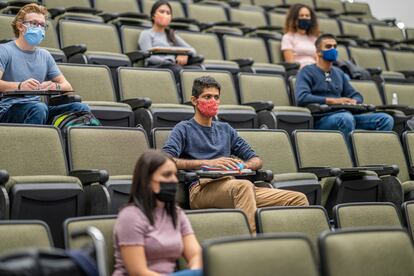University facing class-action over Covid-19 campus lockdown
Current and former students of the University of Delaware claim the school breached contractual obligations and unjustly enriched itself by halting in-person classes and shutting down the campus in 2020

A federal judge has granted class-action status in a lawsuit in which current and former students of the University of Delaware claim the school breached contractual obligations and unjustly enriched itself by halting in-person classes and shutting down the campus in 2020 because of the coronavirus pandemic.
Overruling several objections by attorneys for the university, Judge Stephanos Bibas said Friday that the lawsuit can proceed as a class action on behalf of thousands of students who were enrolled as undergraduates in the spring semester of 2020 and paid tuition.
The ruling came just days before a scheduled hearing this week on the university’s request for the judge to grant summary judgment in its favor. That hearing has been postponed indefinitely.
In his ruling, Bibas rejected UD’s argument that the plaintiffs lacked standing to sue. The university also argued unsuccessfully that it is impossible to know who actually paid tuition because some students may have used outside sources like scholarships.
“Those students, no less than students who paid out of their own pockets, were parties to a contract that U. Delaware allegedly breached,” wrote the judge, who noted that the only students excluded from the class would be those who received full rides. “Because U. Delaware has enough records to figure out which students did not get full rides, there is a reliable way to determine who those students are.”
According to the ruling, more than 17,000 undergraduates were enrolled at UD in spring 2020, and the university collected more than $160 million in tuition.
The plaintiffs have argued that, before the pandemic, the school treated in-person and online classes as separate offerings and charged more for some in-person programs than they did for similar online classes. They also noted that the university charged them fees for the gym, student centers, and the health center, sometimes at higher rates than those paid by online students, and that the school kept those fees while denying them the services.
The plaintiffs are seeking partial refunds of their spring 2020 tuition, having earlier agreed to dismiss their claims arising from student fees.
The university claimed that none of the named plaintiffs who brought the lawsuit paid tuition, so none is a member of the proposed class.
“That is false,” Bibas wrote. “The named plaintiffs paid tuition, through either loans or cash from their parents.”
Whether students were part-time or full-time might affect the damages to which they are entitled but does not affect the school’s liability, the judge added.
Bibas previously ruled that the plaintiffs had plausibly alleged that the school implicitly promised them in-person classes, activities and services, noting that promises “need not be express to be enforceable.’”
“Though U. Delaware nowhere promised in-person classes expressly, it may have done so impliedly through its conduct,” he reiterated in Friday’s ruling. “.... To decide whether holding classes in person was part of the parties’ bargain, I anticipate looking at evidence of how U. Delaware advertised itself and whether students were attending classes in person before the pandemic.”
The judge previously rejected the university’s argument that it expressly reserved the right to go online, but he noted Friday that the plaintiffs’ right to restitution depends on the school’s “net enrichment.”
“If U. Delaware got a greater benefit than the students, then it was probably unjust for the school to keep the students’ money, as that enrichment has no basis in a valid agreement,” Bibas wrote. “But if an online education in spring 2020 was worth full tuition, then there was no net enrichment.”
The judge said net enrichment will be measured by taking the amount the university received from each student and subtracting the “fair market value” of the services it provided to each — a calculation he acknowledged will be difficult. The fact that some students may have had better grades in spring 2020 than in previous semesters, or that some joined more clubs or took more advantage of student services than others did, is not relevant in that calculation, he said.
“These services are available to all students for the same fixed price. And though students may make more or less (or better or worse) use of them, that does not change their fair market value,” the judge wrote.
Sign up for our weekly newsletter to get more English-language news coverage from EL PAÍS USA Edition
Tu suscripción se está usando en otro dispositivo
¿Quieres añadir otro usuario a tu suscripción?
Si continúas leyendo en este dispositivo, no se podrá leer en el otro.
FlechaTu suscripción se está usando en otro dispositivo y solo puedes acceder a EL PAÍS desde un dispositivo a la vez.
Si quieres compartir tu cuenta, cambia tu suscripción a la modalidad Premium, así podrás añadir otro usuario. Cada uno accederá con su propia cuenta de email, lo que os permitirá personalizar vuestra experiencia en EL PAÍS.
¿Tienes una suscripción de empresa? Accede aquí para contratar más cuentas.
En el caso de no saber quién está usando tu cuenta, te recomendamos cambiar tu contraseña aquí.
Si decides continuar compartiendo tu cuenta, este mensaje se mostrará en tu dispositivo y en el de la otra persona que está usando tu cuenta de forma indefinida, afectando a tu experiencia de lectura. Puedes consultar aquí los términos y condiciones de la suscripción digital.








































